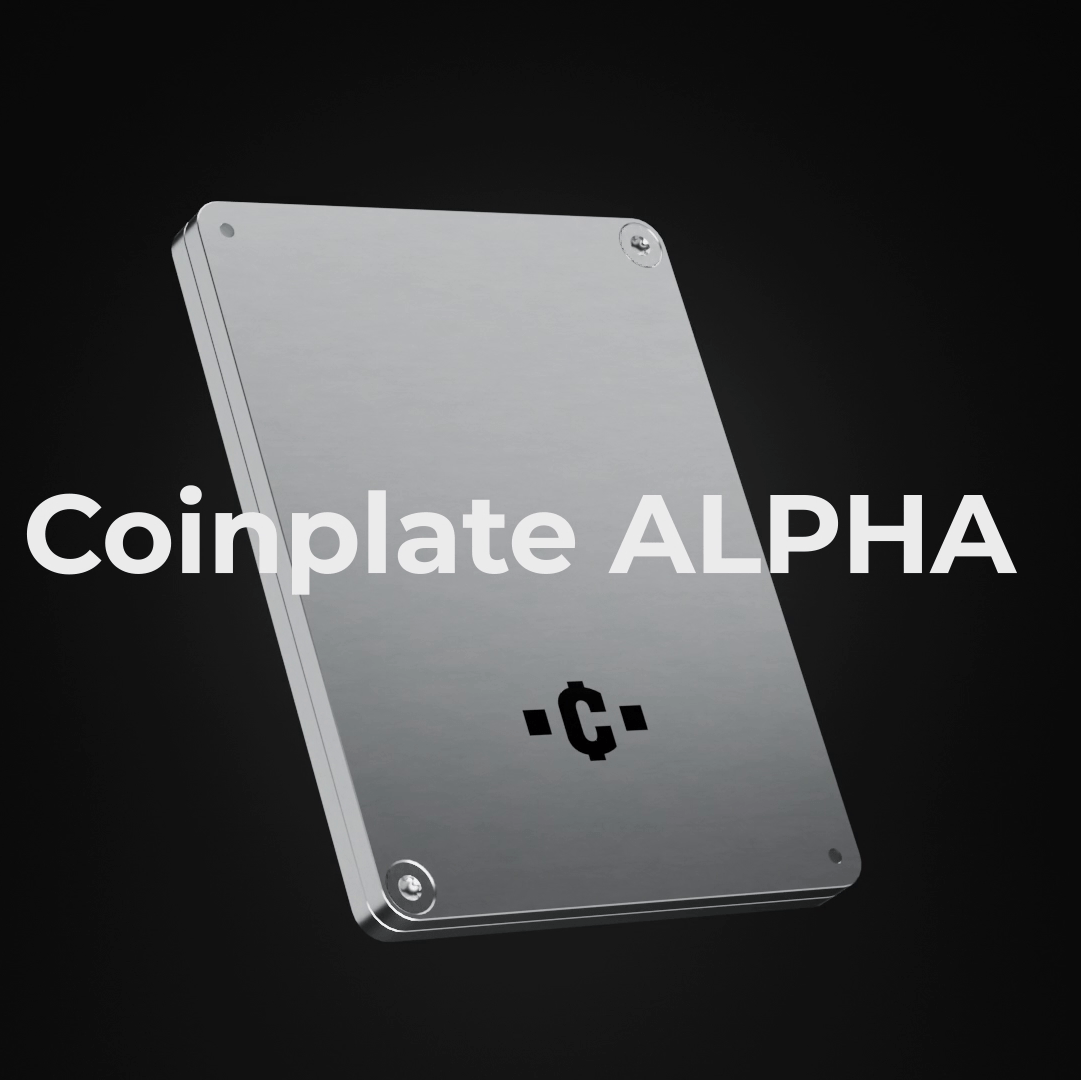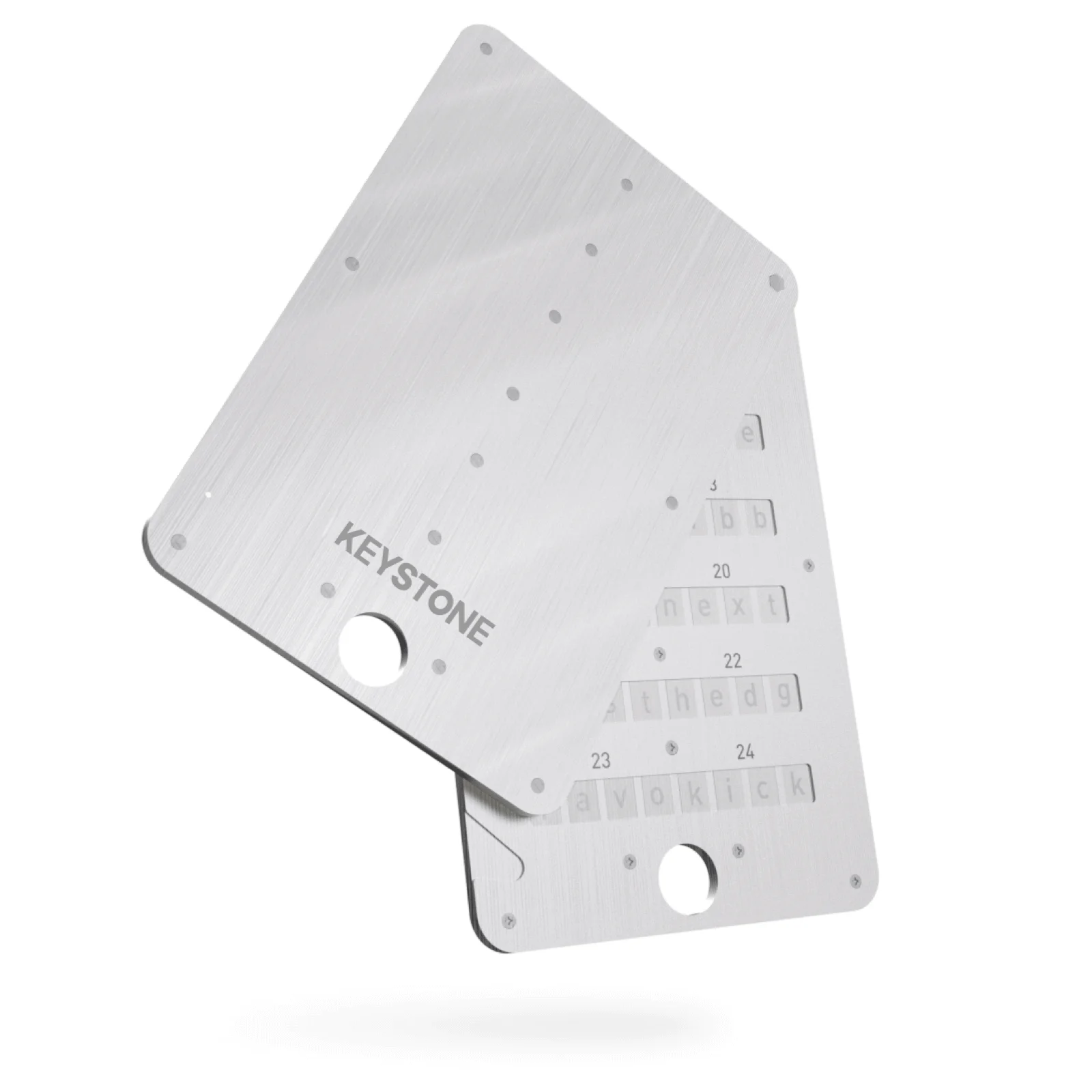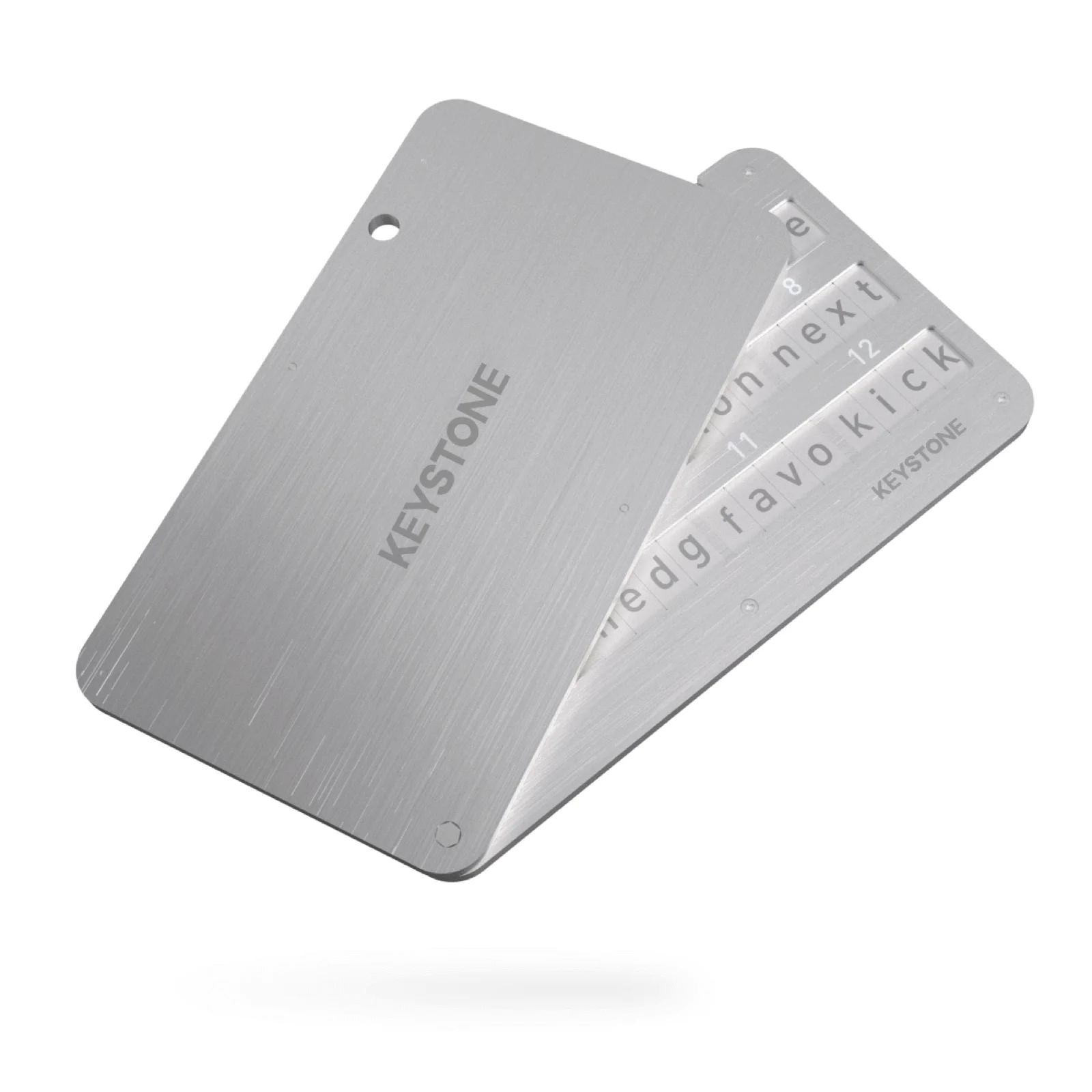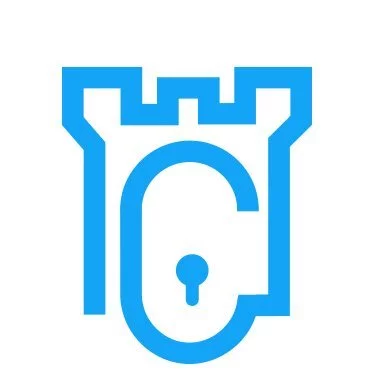When it comes to the best offline wallet for cryptocurrency, several options are available. These wallets offer excellent security features, compatibility with multiple cryptocurrencies, and additional functionalities that make them stand out from the rest. Here is a list of the top choices
Disclosure! This List contains links that may earn us a small commission at no extra cost to you. Our website’s metrics and compensation determine the order of the List. Please don’t consider it as ranking and evaluate items individually.Secure Hardware Wallet for Bitcoin, ETH, USDT and all crypto
Founded in Malaysia in 2019 by a highly experienced group of IT professionals who combined the latest hardware and software technologies to build the most secure and simple hardware wallet for cryptocurrencies.
Crypto Hardware Wallet
The GridPlus Lattice1 and SafeCards use uncompromising security to enable the most secure cryptocurrency storage ever created.
Secure Cryptocurrency Hardware Wallet
Trezor is the world’s first and most secure cryptocurrency hardware wallet. Your information is kept safe and never stored on servers.
Own Your Crypto In Style
CoolWallet is one of the most secure crypto hardware wallets for Bitcoin, Ethereum, Litecoin, Bitcoin Cash, and ERC20 Token.
The Next Frontier of Crypto Security
A KeepKey-secured platform built to handle all of your crypto needs. KeepKey is the premier wallet in the new ShapeShift Platform.
Offline Wallets Guide
Guide to Crypto Offline Wallets
As the popularity of cryptocurrency grows, so does the need for secure storage solutions. Crypto offline wallets, also known as cold wallets, are a reliable option for safeguarding digital assets against hacking and theft.
Cold wallet crypto is essentially a physical device or paper that stores cryptocurrency offline, making it inaccessible to hackers and malware that target online wallets. These wallets can be used for any type of cryptocurrency, including Bitcoin, Ethereum, and Litecoin.
Using a cold wallet for cryptocurrency ensures that private keys and other sensitive information related to the wallet are kept offline. This eliminates the risk of cyber attacks, as even if a hacker gains access to the computer or device used to access the wallet, they will not be able to access the stored information without physical access to the wallet itself.
There are various types of crypto offline wallets available in the market, each with their own advantages and disadvantages. Some popular options include paper wallets, hardware wallets, software wallets with offline functionality, and mobile wallets with offline capabilities.
Key Takeaways:
- Crypto Offline Wallets, also known as cold wallets, are a secure storage option for cryptocurrency.
- Using a cold wallet for cryptocurrency eliminates the risk of cyber attacks.
- There are different types of crypto offline wallets, including paper wallets, hardware wallets, software wallets with offline functionality, and mobile wallets with offline capabilities.
Understanding Offline Wallets
Crypto offline wallets, also known as cold wallets or cold storage wallets, are physical devices designed to store cryptocurrency offline, away from the reach of potential hackers or other security risks. These wallets provide an extra layer of security for cryptocurrency holders, ensuring that their digital assets are safe even in the event of a data breach.
Unlike online wallets, which are connected to the internet, offline wallets are not susceptible to online attacks. They are typically encrypted and require a physical device or two-factor authentication to access the cryptocurrency stored within.
The Benefits of Cold Storage Wallets
The most significant benefit of using a cold storage wallet is the increased security it provides. By storing cryptocurrency offline, it is impossible for hackers to gain access to it via the internet. Additionally, cold storage wallets allow users to remain in control of their private keys, eliminating the need to trust a third-party financial institution with their digital assets. These benefits make cold storage wallets the preferred choice of many serious cryptocurrency investors.
Types of Cold Storage Wallets
There are several types of cold storage wallets available on the market. The most common types of cold wallets include paper wallets, hardware wallets, and software wallets that offer offline functionality.
| Type of Cold Storage Wallet | Features | Examples |
|---|---|---|
| Paper Wallets | Free to use, easy to create, and can be stored offline | BitAddress, WalletGenerator.net |
| Hardware Wallets | Include advanced security features and are specially designed for cryptocurrency storage | Trezor, Ledger Nano S, KeepKey |
| Software Wallets with Offline Functionality | Can be used both online and offline, offer more flexibility than hardware wallets | Armory, Electrum, Exodus |
When selecting a cold storage wallet, it is important to consider the features and benefits of each type before making a decision. Hardware wallets, for example, offer the highest level of security, while paper wallets are a cost-effective option for those on a budget. Software wallets that offer offline functionality are a good option for those who need more flexibility in their cryptocurrency storage.
Overall, cold storage wallets are an essential tool for any serious cryptocurrency investor. By utilizing these wallets, investors can ensure that their digital assets remain secure and protected from potential security risks.
Paper Wallets: A Secure Option
When it comes to offline wallets, paper wallets are a popular choice due to their simplicity and high level of security. A paper wallet is essentially a physical printout of your private and public keys, which can be generated using a dedicated paper wallet generator website or software.
One of the key benefits of a paper wallet is that they are not connected to the internet, making them less vulnerable to hacking attempts. Additionally, they can be stored in a safe or other secure location, providing an extra layer of protection against theft.
Creating a paper wallet is a relatively simple process. First, you will need to generate your private and public keys using a paper wallet generator. Once generated, you can print out your wallet on a plain piece of paper or even write it down manually. It is important to note that you should never store a paper wallet on a device that is connected to the internet, as this could compromise the security of your keys.
While paper wallets offer a high level of security, there are some potential drawbacks to consider. For example, paper can degrade over time and become unreadable, potentially leading to loss of access to your funds. Additionally, paper wallets do require a bit of technical knowledge to set up and use properly, which may not be ideal for beginners.
Overall, if you are comfortable with the technical aspects of using a paper wallet, it can be an excellent option for storing your cryptocurrency offline. Just be sure to take the necessary precautions to protect your paper wallet from physical damage and keep it stored securely.
Best Practices for Using Cold Wallet Paper
| Do: | Don’t: |
|---|---|
| Store your paper wallet in a secure location, such as a safe or strongbox | Store your paper wallet in an easily accessible location |
| Make multiple copies of your paper wallet and store them in separate locations | Store your paper wallet on a device that is connected to the internet |
| Protect your paper wallet from physical damage by laminating it or using a protective cover | Throw away your paper wallet without securely disposing of it first |
| Only use paper wallet generators from reputable sources | Share your private keys with others |
By following these best practices, you can ensure the security of your cold wallet paper and reduce the risk of losing access to your cryptocurrency holdings.
Hardware Wallets: The Ultimate Cold Storage
Hardware wallets are considered the most secure option for cold storage crypto wallet solutions. They come in the form of a physical device that can be plugged into a computer or mobile device to manage cryptocurrency securely. The private keys are stored on the device and not connected to the internet, ensuring that they are not vulnerable to hacking or other cybersecurity threats.
Features of Hardware Wallets
Hardware wallets offer the following features:
- Offline storage of private keys
- Password protection for added security
- Compatibility with multiple cryptocurrencies
- Easy to use interface
When choosing the best crypto cold wallet, it is essential to consider the features that you need to ensure that your digital assets are secure.
Setting up Hardware Wallets
Setting up a hardware wallet involves the following steps:
- Choose a reputable hardware wallet provider, such as Ledger or Trezor
- Connect the device to your computer or mobile device and follow the setup instructions
- Record the seed phrase on a piece of paper and store it in a secure location
- Create a strong password for your hardware wallet
It is important to follow the setup instructions carefully and keep your seed phrase and password secure to prevent unauthorized access to your cryptocurrency.
Best Hardware Wallets for Cold Storage Crypto Wallet
Some of the best hardware wallets for crypto wallet cold storage include:
| Hardware Wallet Providers | Features | Price |
|---|---|---|
| Ledger Nano X | Bluetooth-enabled, supports multiple cryptocurrencies, mobile compatibility | $119 |
| Trezor Model T | Touchscreen display, supports multiple cryptocurrencies, open-source software | $169 |
| Coinbase Wallet | Mobile compatibility, supports multiple cryptocurrencies, user-friendly interface | Free |
When selecting the best crypto cold wallet, it is important to consider your budget and which features are most important to you.
Software Wallets: Offline Solutions
While software wallets are typically used for online transactions, some offer offline functionality for added security. These wallets allow users to manage their funds offline and minimize the risk of hacking or theft.
Some of the best offline crypto wallets available include:
- Electrum: An open-source Bitcoin wallet that supports offline storage with its “cold storage” feature.
- Armory: A wallet known for its advanced security features, including multi-signature support and cold storage capabilities.
- Wasabi: A privacy-focused Bitcoin wallet that offers offline storage with its “coldcard” integration.
Keep in mind that while software wallets do offer added security with offline functionality, they are still vulnerable to hacking or malware attacks. It is important to ensure that the computer or device used for accessing the wallet is secure and free from any malicious software.
Comparison Table: Offline Software Wallets
| Wallet | Offline Functionality | Security Features | Supported Cryptocurrencies |
|---|---|---|---|
| Electrum | Yes – Cold storage | Two-factor authentication, multi-signature support, seed phrase backup | Bitcoin only |
| Armory | Yes – Cold storage | Multi-signature support, paper wallet backup, wallet encryption | Bitcoin only |
| Wasabi | Yes – With Coldcard hardware wallet | Privacy-focused features, seed phrase backup, Tor network support | Bitcoin only |
When choosing an offline software wallet, be sure to consider the security features and supported cryptocurrencies to ensure it meets your needs. It is also recommended to regularly update the wallet software and backup your seed phrase in a secure location.
Mobile Wallets with Offline Capabilities
Mobile wallets that offer offline capabilities provide users with a convenient alternative to desktop wallets. These wallets allow you to send and receive cryptocurrency using your mobile device, even if you are not connected to the internet. This makes them an excellent choice if you frequently travel or need access to your funds while on the go.
When choosing the best crypto offline wallet for your mobile device, there are a few factors to consider. First, you want to ensure that the wallet is compatible with your device’s operating system. Most mobile wallets support both iOS and Android, but it’s always a good idea to double-check before downloading.
Another important consideration is the wallet’s security features. Look for a wallet that offers two-factor authentication and encryption to protect your private keys and transactions from unauthorized access. Additionally, consider whether the wallet allows you to set up a PIN or password for added security.
Here are some of the best offline mobile wallets for managing cryptocurrency on the go:
| Wallet Name | Compatibility | Security Features |
|---|---|---|
| BRD Wallet | iOS, Android | Two-factor authentication, PIN security |
| Coinomi | iOS, Android | Two-factor authentication, password protection |
| Exodus | iOS, Android | Two-factor authentication, Face ID/Touch ID, PIN security |
It’s important to note that while mobile wallets offer the convenience of on-the-go access, they may not provide the same level of security as hardware wallets or paper wallets. Therefore, it’s essential to take extra precautions to protect your device and wallet from theft or loss.
Overall, mobile wallets with offline capabilities are a great option for managing your cryptocurrency holdings while on the go. By choosing a wallet with robust security features and regularly updating your device’s software, you can enjoy the convenience of mobile wallet access without compromising the security of your digital assets.
Selecting the Best Crypto Offline Wallet
Choosing the best cold wallet for cryptocurrency is a crucial step in securing your digital assets. Here are some factors to consider when selecting an offline wallet:
- Security features: Look for wallets that offer advanced security measures such as two-factor authentication, multi-signature functionality, and PIN protection. These features help prevent unauthorized access to your funds and add an extra layer of protection to your wallet.
- User interface: A user-friendly interface is vital to ensure easy navigation and management of your digital assets. Choose a wallet that is easy to use and provides a seamless experience for managing cryptocurrency.
- Compatibility: Consider the compatibility of the wallet with the cryptocurrencies you hold. Some wallets may support a limited number of cryptocurrencies, while others may be compatible with a wide range.
- Additional functionalities: Some wallets offer additional functionalities such as built-in exchanges or portfolio tracking. Take these into consideration when selecting a wallet to suit your specific needs.
Setting Up Your Crypto Offline Wallet
Once you have selected the best cryptocurrency cold wallet or cold storage wallet crypto to store and secure your digital assets, the next step is to set it up. Follow these steps to ensure a secure setup process:
- Choose a secure location: Select a location that is safe from physical and environmental damage, such as fire or water.
- Install the necessary software: Most offline wallets require software installation to function correctly. Install the software on a trusted, secure computer with updated anti-virus and anti-malware programs.
- Create a new wallet: Follow the instructions provided by the wallet manufacturer to create a new wallet. Ensure that you create a strong, unique password, and store it in a secure location.
- Back up your wallet: Back up your wallet immediately upon creation. This critical step ensures that you can recover your wallet and digital assets in case of damage or loss.
- Configure additional security settings: Configure any additional security settings provided by the wallet manufacturer, such as two-factor authentication or PIN codes.
| Tip: | Create a separate email address for your offline wallet and use it solely for wallet-related communication. This helps to minimize the risk of phishing scams and other online threats. |
|---|
Follow the instructions provided by the wallet manufacturer when setting up your cryptocurrency cold wallet or cold storage wallet crypto. If you have any doubts about the setup process, consult the wallet manufacturer’s website or contact their customer service for assistance.
Transferring Funds to Your Offline Wallet
Once you have selected your preferred offline wallet, the next step is to transfer your cryptocurrency holdings from your online or exchange wallet to the offline wallet for secure, long-term storage. Here are some steps to follow:
- Ensure that your chosen offline wallet supports the cryptocurrencies you wish to transfer.
- Generate a new receiving address within your offline wallet.
- Copy the address and paste it into the recipient field of your online or exchange wallet.
- Specify the amount of cryptocurrency you wish to transfer.
- Double-check all details, including the address, amount, and transaction fee, before confirming the transaction.
- Wait for the transaction to be confirmed on the blockchain, which can take anywhere from a few minutes to several hours.
Note that transaction fees may vary depending on the amount of cryptocurrency being transferred and the current network congestion. It is important to factor in the transaction fee when calculating the total amount to transfer.
Using an offline wallet for cryptocurrency storage provides an added layer of security against potential cyber threats. However, it is important to take all necessary precautions when transferring funds to the offline wallet to ensure that the transaction is executed safely and accurately.
Protecting Your Crypto Offline Wallet from Physical Damage
One of the essential aspects of safeguarding your cryptocurrency is protecting your cold storage crypto wallet from physical damage. While offline wallets offer excellent security against digital threats, they are still vulnerable to physical damage from fire, water, or other accidents. Below are some tips and best practices to help keep your cryptocurrency safe:
- Choose a durable storage solution: Invest in a high-quality case or safe to store your crypto offline wallet. Look for products that are fireproof and waterproof for maximum protection.
- Choose a secure location: Keep your offline wallet in a secure location that is away from potential hazards. Avoid storing it near water sources, in direct sunlight, or near flammable materials.
- Backup your wallet: Create a backup of your cryptocurrency cold storage wallet, and store it in a separate, safe location in case of physical damage to the original wallet.
- Use caution when transporting: When moving your cold wallet for cryptocurrency, ensure that it is securely stored and protected against bumps or scratches. Consider using a protective case or bag to carry it.
Following these precautions will help ensure that your cryptocurrency cold storage wallet remains safe from physical harm and that you can access your digital assets when needed.
Managing Multiple Cryptocurrencies with Offline Wallets
Investors and traders holding multiple cryptocurrencies need to manage these assets efficiently to ensure maximum security and accessibility. Using offline wallets is one of the best ways to store and manage digital assets securely, and several wallets can manage multiple cryptocurrencies simultaneously. Below are some tips on how to manage multiple cryptocurrencies with offline wallets:
Cold Wallets
Cold wallets, also known as hardware wallets, are popular among cryptocurrency enthusiasts as they provide maximum security for digital assets. Many of these wallets support multiple cryptocurrencies, making them a cost-effective option for those holding several coins or tokens. Some of the best cold wallets for managing multiple cryptocurrencies include:
| Wallet Name | Supported Cryptocurrencies |
|---|---|
| Trezor | Bitcoin, Ethereum, Litecoin, Bitcoin Cash, and many more |
| Ledger Nano S | Bitcoin, Ethereum, Litecoin, Ripple, and many more |
| KeepKey | Bitcoin, Ethereum, Litecoin, Bitcoin Cash, and many more |
Software Wallets
Software wallets are another offline option for managing multiple cryptocurrencies. Some software wallets offer support for multiple cryptocurrencies, while others are optimized for a particular coin or token. Here are some of the best software wallets for managing multiple cryptocurrencies:
- Exodus – Supports over 100 cryptocurrencies, including Bitcoin, Ethereum, Litecoin, and many more.
- Coinomi – Supports over 1,500 cryptocurrencies, including Bitcoin, Ethereum, Litecoin, and many more.
- Atomic Wallet – Supports over 300 cryptocurrencies, including Bitcoin, Ethereum, Litecoin, and many more.
Choosing the Best Wallet for Your Needs
When selecting a wallet for managing multiple cryptocurrencies, there are several factors to consider. Security, ease of use, and supported cryptocurrencies are some of the most important considerations. It’s also important to ensure that the wallet is compatible with the operating system of the device you plan to use it on.
Cold wallets are generally considered the best option for managing multiple cryptocurrencies, as they provide the highest level of security. However, software wallets can also be a good choice, especially for those who prioritize ease of use and portability.
Ultimately, the best wallet for managing multiple cryptocurrencies will depend on your individual needs and preferences. By considering the factors above and doing your research, you can find a wallet that meets your needs and provides maximum security for your digital assets.
Keeping Your Offline Wallet Updated
Regularly updating your crypto cold storage wallet is crucial for maintaining its security and staying protected against potential threats. Security updates often include bug fixes and vulnerability patches, ensuring that your wallet is up-to-date with the latest security measures.
Here are some important steps to take to keep your cold storage wallet crypto updated:
- Check for updates: Regularly check the website of the wallet provider for new software updates.
- Download the latest version: Once a new update is available, download the latest version and follow the installation instructions carefully.
- Ensure backup: Before updating, make sure to secure your offline wallet’s backup.
- Update security features: Some wallets may require updating security features, such as password changes or two-factor authentication.
- Test the wallet after updating: After updating your wallet’s software, test it by sending a small amount of cryptocurrency to ensure that everything is working correctly.
By following these simple steps, you can ensure that your crypto cold storage wallet remains secure and up-to-date with the latest security measures, providing peace of mind for your cryptocurrency holdings.
Recovering Lost or Stolen Offline Wallets
Despite taking all the necessary precautions, there is always a risk of losing access to your offline wallet or having it stolen. In such cases, it is important to take immediate action to recover your funds.
If your wallet is lost or stolen, here are some steps you can take:
- Report the theft or loss to the relevant authorities, such as the local law enforcement agency or the exchange from which you transferred your funds.
- If you have a hardware or paper wallet, check if you have a backup of your wallet seed phrase or private key. This backup can be used to restore your wallet and regain access to your funds.
- If you do not have a backup, contact the manufacturer of your wallet device or seek the help of a professional recovery service. While these options may come with a fee, they may be worth the cost to recover your valuable cryptocurrency.
Preventing Loss or Theft of Your Offline Wallet
While it is important to know what to do in case of loss or theft of your offline wallet, preventing such incidents from occurring in the first place is even better. Here are some best practices to help keep your wallet safe:
- Store your wallet in a secure, hidden location that is only accessible to you. Consider using a fireproof and waterproof safe or a safety deposit box.
- Make sure to keep your backup seed phrase or private key in a separate, secure location.
- Avoid storing your wallet information on any electronic device that is connected to the internet, as this can increase the risk of hacking or cyber attacks.
- Be wary of phishing scams or unsolicited emails asking for your wallet information. Always verify the source and legitimacy of any requests for access to your wallet.
By following these tips, you can help ensure the safe and secure storage of your cryptocurrency funds in your offline wallet.
Protecting Your Crypto Offline Wallet from Physical Damage
Crypto offline wallets are a valuable tool for ensuring the security of your digital assets. However, they are not immune to physical damage. It is essential to protect your offline wallet from potential threats, such as water, fire, or other accidents, to ensure the longevity of the wallet and prevent loss of cryptocurrency.
Here are some tips and best practices for protecting your cold crypto wallet:
Use a Durable Storage Solution
Invest in a durable storage solution that safeguards your offline wallet from physical damage. A good option is a fireproof and waterproof safe that can protect your wallet from natural disasters or theft. Alternatively, you can use a safety deposit box at a reputable bank to store your wallet.
Ensure Proper Handling
When handling your cold storage wallet, ensure you are in a safe and secure environment. Avoid exposing the wallet to extreme temperatures or moisture, as this can damage the device. Additionally, be careful not to drop, scratch, or damage the surface of the wallet, as this can cause internal damage to the device.
Create a Backup
Creating a backup of your offline wallet is crucial in case of loss or damage. Ensure that you keep the backup in a secure location, such as a safe or safety deposit box.
Take Precautions During Travel
If you need to travel with your cold wallet for cryptocurrency, take proper precautions to protect it from damage or theft. Use a sturdy and secure carrying case to transport the wallet and avoid exposing it to extreme temperatures or moisture. Additionally, avoid leaving the device unattended in public places, such as airports or hotels.
By following these tips and best practices, you can protect your cold storage wallet from physical damage and ensure the security of your cryptocurrency holdings.
Security Considerations and Best Practices
When it comes to securing cryptocurrency, using offline wallets is only part of the solution. To ensure maximum protection, there are a number of security considerations and best practices to keep in mind. Here are some of the top cold wallets and best cold wallet crypto security practices to follow:
Two-Factor Authentication:
Many offline wallets offer two-factor authentication (2FA), which adds an extra layer of security to the login process. Enabling 2FA can help prevent unauthorized access to your wallet, even if someone has your password.
Secure Network Connections:
When accessing your offline wallet online, make sure you are using a secure network connection. Avoid using public Wi-Fi or unsecured networks, as they can be vulnerable to hacking and other security threats.
Regularly Check for Updates:
Make sure to regularly check for updates and security patches for your offline wallet. Updating to the latest version can help address any known security vulnerabilities and ensure your wallet is functioning optimally.
Avoid Common Security Pitfalls:
Be aware of common security pitfalls, such as phishing scams, malware, and social engineering tactics. Verify any requests for sensitive information before providing it and always be cautious when opening emails or clicking links from unknown sources.
Store Backups Securely:
When creating a backup of your offline wallet, make sure to store it securely. Consider using encrypted backups and multiple storage locations to ensure redundancy and protection against loss or theft.
| Top Cold Wallets | Best Cold Wallet Crypto |
|---|---|
| Ledger Nano X | Trezor Model T |
| Trezor Model T | Ledger Nano X |
| KeepKey | KeepKey |
Table: Comparison of Top Cold Wallets and Best Cold Wallet Crypto
Use Unique and Strong Passwords:
When creating a password for your offline wallet, make sure it is unique and strong. Avoid using easily guessable passwords or reusing passwords from other accounts, as these can make your wallet more vulnerable to hacking and other security threats.
Regularly Monitor Your Wallet:
Make sure to regularly monitor your offline wallet for any suspicious activity or unauthorized transactions. Being proactive and vigilant can help prevent potential security breaches before they happen.
By following these security considerations and best practices, you can help ensure the safety and security of your cryptocurrency holdings. Remember, the ultimate responsibility for protecting your digital assets lies with you, so take all necessary precautions to keep your offline wallet secure.
Conclusion
Protecting one’s cryptocurrency holdings is of paramount importance in today’s digital age. With the surge of cyber attacks and advanced hacking techniques, it has become increasingly crucial to secure digital assets through offline storage solutions. Cold wallets have emerged as an effective means of securing cryptocurrency, offering superior protection against online threats.
Throughout this guide, we have covered a range of topics related to crypto offline wallets. We provided an overview of their importance and different types available, including paper wallets, hardware wallets, software wallets, and mobile wallets with offline capabilities. We discussed the key features of each type, along with their relative advantages and disadvantages.
Additionally, we covered important considerations when selecting, setting up, and managing offline wallets. We explored backup strategies, options for managing multiple cryptocurrencies, the importance of keeping wallets updated, and measures to combat physical damage and loss or theft of wallets. We also discussed best practices for ensuring the security of offline wallets.
Overall, by utilizing a crypto offline wallet, individuals can rest assured that their digital assets are secure and protected from online threats. It is crucial to take action and safeguard one’s cryptocurrency holdings by selecting the best offline wallet, following proper procedures for setup and maintenance, and implementing necessary security measures.
Take Action Now
Don’t delay in securing your cryptocurrency; take action now by implementing the strategies and best practices discussed in this guide. Whether you opt for a paper wallet, hardware wallet, or software wallet, ensure that your digital assets are safe and secure. Remember, a little effort in securing your cryptocurrency can go a long way in protecting your assets in the long run.
Offline Wallets F.A.Q
What are crypto offline wallets?
Crypto offline wallets, also known as cold wallets, are a type of cryptocurrency wallet that stores private keys offline, away from internet-connected devices. By keeping the private keys offline, they provide enhanced security and protect against online threats.
Why are crypto offline wallets important for securing cryptocurrency?
Crypto offline wallets are important for securing cryptocurrency because they keep the private keys offline, making it difficult for hackers or malware to access them. This significantly reduces the risk of theft or unauthorized access to your digital assets.
What are the different types of offline wallets available in the market?
There are different types of offline wallets available in the market, including paper wallets, hardware wallets, software wallets with offline functionality, and mobile wallets with offline capabilities. Each type offers its own set of features and benefits.
How do offline wallets work?
Offline wallets work by storing private keys offline, either on physical mediums like paper or hardware devices. When making transactions or accessing funds, the offline wallet interacts with online software or networks securely, without exposing the private keys to potential threats.
What are the benefits of using cold storage wallets?
Cold storage wallets, such as hardware wallets or paper wallets, offer benefits like enhanced security, protection against online threats, and the ability to store cryptocurrency offline. They provide peace of mind by keeping your digital assets safe from hackers and malware.
How can I create a paper wallet?
Creating a paper wallet involves generating a new public and private key pair offline and printing them on a physical piece of paper. It is important to follow secure practices and store the paper wallet in a safe and secure location to prevent loss or theft.
What are the advantages of hardware wallets?
Hardware wallets offer several advantages, such as secure storage of private keys in tamper-resistant devices, protection against malware and keyloggers, ability to sign transactions offline, and compatibility with multiple cryptocurrencies.
Are there software wallets that offer offline functionality?
Yes, there are software wallets that offer offline functionality. These wallets allow users to create and manage their wallets offline, and then connect to the internet for transactions or updates securely. They are a convenient option for those who prefer software-based solutions.
Which mobile wallets offer offline capabilities?
There are mobile wallets available that offer offline capabilities, allowing users to access their wallets and manage transactions without an internet connection. Some popular options include XYZ Wallet, ABC Wallet, and 123 Wallet.
How can I select the best crypto offline wallet?
To select the best crypto offline wallet, consider factors such as security features, user interface, compatibility with your preferred cryptocurrencies, customer reviews, and additional functionalities like multi-signature support or integration with other services.
How do I set up my crypto offline wallet?
Setting up a crypto offline wallet typically involves downloading the wallet software or connecting a hardware wallet to your computer or mobile device. Follow the specific instructions provided by the wallet provider or manufacturer to create your wallet and secure your private keys.
How can I transfer funds to my offline wallet?
To transfer funds to your offline wallet, you need to generate a receive address from your wallet software or hardware, and then provide that address to the sender. The sender can then initiate the transfer to your offline wallet address.
How can I secure my offline wallet backup?
To secure your offline wallet backup, consider options like encrypting the backup file, storing it in multiple physical locations, and utilizing secure cloud storage services. It is important to protect your backup from unauthorized access and potential physical damage.
How can I manage multiple cryptocurrencies with offline wallets?
Managing multiple cryptocurrencies with offline wallets requires selecting a wallet that supports the specific cryptocurrencies you own. Some wallets offer multi-currency support, while others may need separate wallets for each cryptocurrency. Ensure compatibility and follow the wallet software’s instructions for managing different cryptocurrencies.
How can I keep my offline wallet updated?
To keep your offline wallet updated, periodically check for software updates from the wallet provider or manufacturer. Follow their instructions for safely updating your wallet, ensuring the latest security patches and features are installed while maintaining the integrity of your private keys.
What should I do if I lose access to my offline wallet?
In the event of losing access to your offline wallet, refer to the wallet’s recovery instructions or contact the wallet provider’s customer support. They can guide you through the recovery process, which may involve using backup phrases, seed words, or other methods of restoring access to your wallet.
How can I protect my offline wallet from physical damage?
To protect your offline wallet from physical damage, consider using durable storage solutions like fireproof safes or waterproof containers. Avoid exposing your wallet to extreme temperatures or other potential hazards that could cause physical damage. Additionally, make backup copies of your wallet and store them in separate secure locations.
What are some security considerations and best practices for using crypto offline wallets?
Some security considerations and best practices for using crypto offline wallets include enabling two-factor authentication, using secure network connections, regularly reviewing and updating security settings, and being cautious of phishing attempts or suspicious software downloads.










